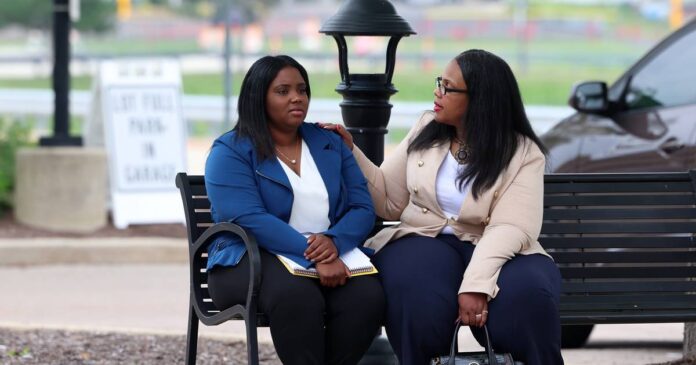A former Naperville North High School student accused of violating a municipal theft ordinance took the stand Wednesday at the DuPage County Courthouse to defend herself, asserting that she didn’t intentionally take another student’s AirPods.
“I didn’t take them; I didn’t steal them,” Amara Harris told the six-person jury on the second day of her trial, a rarity for a municipal citation issued to a student for conduct at school.
A Naperville police officer assigned to Harris’ school wrote her a ticket in 2019, when she was 17. She has maintained since then that she mixed up the AirPods with her own, and has declined to pay a fine or settle the case.
The prosecution argued that it was clear Harris was “caught with her hand in the cookie jar” because the serial number on the AirPods in her possession matched the one on the other student’s set, among other reasons.
The case went to the jury — two women and four men — in the afternoon; deliberations will continue Thursday.
The long battle between Harris and the city of Naperville has contributed to debates over the practice of police officers ticketing students at school, documented last year by the Tribune and ProPublica in the investigation “The Price Kids Pay.”
Because Harris’ case involves a civil violation, the burden of proof is less than for a criminal charge. Prosecutors must show only that a “preponderance of the evidence” supports the allegation, or that it more than likely happened. The maximum penalty for violating the theft ordinance is a $500 fine, in addition to a $100 court fee. There’s no threat of jail time.
Harris testified Wednesday that she lost her AirPods one morning at school. When she retraced her steps to the learning commons, she said, she found earbuds she thought were hers. She said that at first they “wouldn’t work” because they weren’t paired with her phone. But she said she was able to connect them later without getting a notification that the AirPods didn’t belong to her.
During cross-examination, city prosecutor Joseph Solon Jr. asked Harris how the AirPods “just happened to have your name on them.” The AirPods’ owner, who testified Tuesday, said a friend had showed her that her AirPods, which had been previously paired with the friend’s computer, now were labeled as “Amara’s AirPods” instead of the owner’s name.
Harris said the name automatically changed on the AirPods when paired, stating that’s how AirPods work. She said she didn’t know the serial number on the device and didn’t take them out of the owner’s backpack during a class they shared, as the AirPods’ owner had suspected.
Solon later said during his closing arguments that the name change is “very telling” and that the AirPods’ owner had to manually change the name when she got them back. He added that Harris had “no intent whatsoever to return them” before she was confronted by school employees.
Much of the closing statements by Harris’ lawyers focused on the credibility of the Naperville police officer who issued the ticket, Juan Leon.
Leon, the school resource officer, testified Tuesday that he “used discretion” to issue the ticket after Harris’ mother, Marla Baker, refused to talk to him. He said he originally considered giving Harris a “station adjustment” instead, meaning Harris would have talked with police and might have been assigned community service with a parent’s consent.
However, Baker testified Wednesday that she met with Leon multiple times. She said she showed him a receipt for the AirPods that Harris purchased in May 2019.
One of Harris’ attorneys, S. Todd Yeary, emphasized that Leon said under oath that he didn’t know whether Harris “knowingly” stole the AirPods. He said Leon basically admitted to writing a ticket because he “got mad” at her mom.
“That should be chilling to anyone who has children,” Yeary said, adding that Harris has no history of disciplinary action in high school or at Spelman College. Yeary, the former chief executive officer of the Rainbow/PUSH Coalition, is one of two well-known civil rights lawyers representing Harris, who is now 20.
The AirPods’ owner said Tuesday that she thought Harris took her AirPods during the class they shared, and she reported it to a dean. The dean then involved Leon, who wrote the ticket.
:quality(70)/cloudfront-us-east-1.images.arcpublishing.com/tronc/KQTN5HXEK5H2PBLUIGIPN7BQTE.JPG)

Afternoon Briefing
Weekdays
Chicago Tribune editors’ top story picks, delivered to your inbox each afternoon.
Stephanie Posey, a principal at Naperville North, testified Wednesday that she had told Baker she thought the situation warranted a one day in-school suspension for Harris but it could wait until she was able to communicate further with Baker. She said Harris never served the suspension because of the COVID-19 pandemic, which took students out of the school.
Harris’ lawyers again asked Wednesday that Judge Monique O’Toole end the case, arguing that the prosecution hadn’t established that Harris knowingly took the AirPods. O’Toole declined, saying it’s up to the jury to decide.
ProPublica and the Tribune first reported on Harris’ case last year as part of “The Price Kids Pay,” in which reporters documented 12,000 tickets Illinois students received over nearly three years for violations including possession of vaping devices, disorderly conduct and truancy. Fines associated with the tickets can run into the hundreds of dollars.
The investigation also found that Black students at Naperville North High School were almost five times more likely than their white classmates to receive tickets. Harris is Black.
Most students who receive municipal ordinance citations admit liability and pay the fine. Because of the lower burden of proof, fighting the tickets is difficult and costly. Baker has said the family spent about $2,000 on legal fees before a nonprofit organization chipped in to help. A Naperville spokesperson previously said the case hasn’t cost the city extra money because a city prosecutor is handling it.



